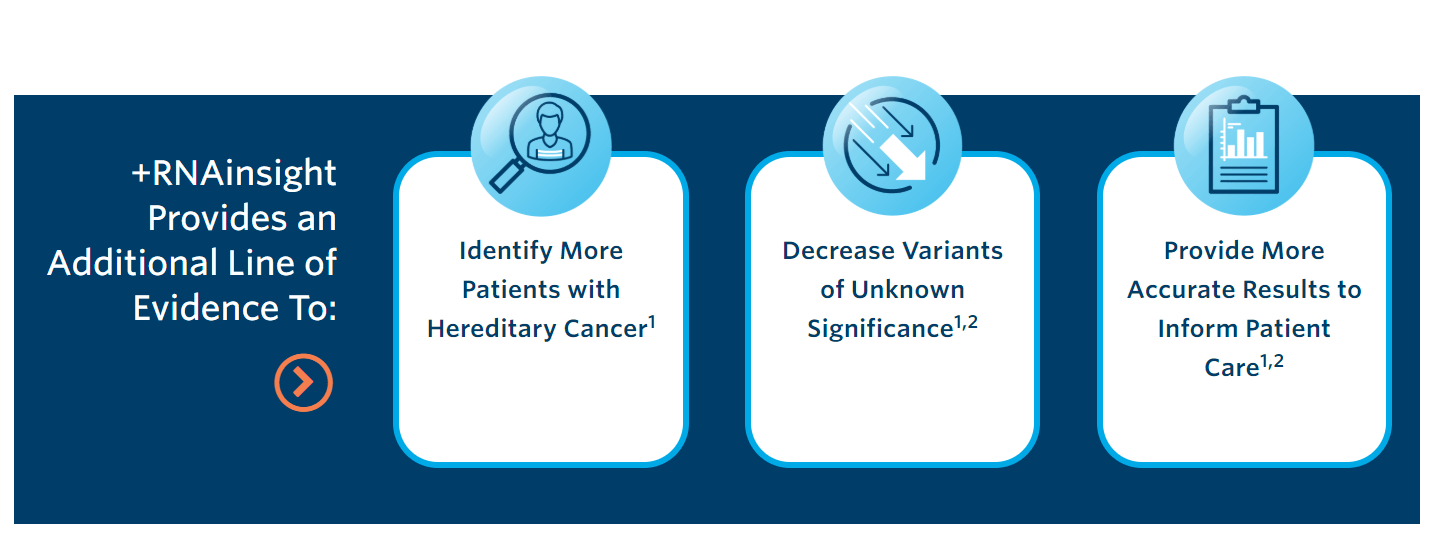– Ambry launches a new genetic test, +RNAinsight that changes the standard for “clinical grade” testing, with higher accuracy.
– +RNAinsight enables clinicians – for the first time ever – to conduct both DNA and RNA genetic testing at the same time.
– Ambry is the first and only lab to offer paired RNA and DNA genetic testing for hereditary cancer.
Ambry Genetics (Ambry), a clinical genetic testing company, announced today the launch of +RNAinsight, a major advancement in genetic testing. +RNAinsight enables clinicians – for the first time ever – to conduct both DNA and RNA genetic testing at the same time. The announcement marks the first genetic testing advancement in over a decade to significantly increase the diagnostic yield (meaning the number of patients identified with a specific hereditary risk for cancer) in genes like BRCA1 and BRCA2. Ambry is the first and only lab to offer paired RNA and DNA genetic testing for hereditary cancer.
DNA-Only Testing May Miss Patients At-Risk For or With Hereditary Cancer

October is Breast Cancer Awareness Month. About 1 in 8 women in the U.S. will develop invasive breast cancer in their lifetime, and more than 41,000 women are expected to die from breast cancer this year. Most people don’t know that up to 10% of women diagnosed with breast cancer have a hereditary tendency to develop the disease. Genetic testing is a preventative measure for hereditary cancers – including breast cancer. However, today’s current genetic testing is very limited.
Paired DNA and RNA Testing Improves Variant Detection and Classification

+RNAinsight changes the standard for “clinical grade” testing, with higher accuracy that has the potential to save 16,000 lives annually, by getting individuals the crucial information they couldn’t discover with DNA testing alone. Substantially more often than DNA testing alone, this paired testing identifies whether someone has a genetic mutation that either increases their risk for developing cancer or that may have contributed to their existing cancer. Real-time RNA testing with +RNAinsight can:
– Identify variants that DNA testing alone can’t find;
– Provide results in two to three weeks, while retrospective testing takes up to six months; and
– Eliminate the need for multiple blood draws and genetic counselor meetings. Paired testing completes the necessary steps in one visit.
Limitations of DNA Testing
DNA testing is the current standard of care in genetic testing for people with family histories and other factors that indicate they may be at greater genetic risks for developing cancer. The issue with relying on DNA testing alone when the patient is first tested is that, while DNA is powerful, it has limitations that can leave men and women who are tested without learning that they do, in fact, have mutations that significantly increase their risks for ovarian, breast, and other cancers.
The breakthrough is adding RNA testing at the same time as DNA testing. If DNA testing is paired with RNA testing at the same time, over 16,000 more people each year can learn whether they’re at risk of developing hereditary cancer. This is the first major, analytical advancement in 13 years to look at genes more deeply when testing for hereditary cancer.
“We developed paired RNA and DNA testing to provide more accurate and conclusive results that patients and doctors can act on,” said Aaron Elliott, Ph.D., CEO of Ambry Genetics. “With +RNAinsight, we not only identify mutations that DNA testing alone would miss, we also provide answers for patients who have been dealing with inconclusive results for years.”
+RNAinsight Prospective Analysis
A prospective analysis of the first 2,500 patients tested with paired RNA and DNA hereditary cancer testing for up to 18 genes, sent in from pilot clinical sites resulted in a relative increase in the diagnostic yield of approximately seven percent. The impact on diagnostic yield varies by gene, with some genes having a relative diagnostic yield increase of over 15%. BRCA1, PMS2, MSH2, and ATM is among the genes for which we are seeing a greater impact.
Thus, paired testing will now let many more patients with mutations in high-risk cancer genes know this when DNA testing alone would not have done so. These patients will now benefit from preventive steps, early detection, reduced cancer incidence, and increased survival, as will their relatives who get tested. Additionally, the data illustrates +RNAinsight’s ability to clarify results that were previously deemed inconclusive as a result of DNA testing alone.
+RNAinsight was able to decrease the number of inconclusive results across the included cancer risk genes by approximately five percent relative to DNA testing alone. +RNAinsight builds on an earlier breakthrough in RNA genetic testing that Ambry led. For three years, Ambry has offered RNA testing retrospectively – looking at RNA after DNA testing was complete. While helpful, retrospective RNA testing has limitations that +RNAinsight does not, such as not being able to identify mutations that the earlier DNA testing failed to find and patients who are lost to follow-up.
+RNAinsight Availability
+RNAinsight is now available through doctors and genetic counselors around the country.
